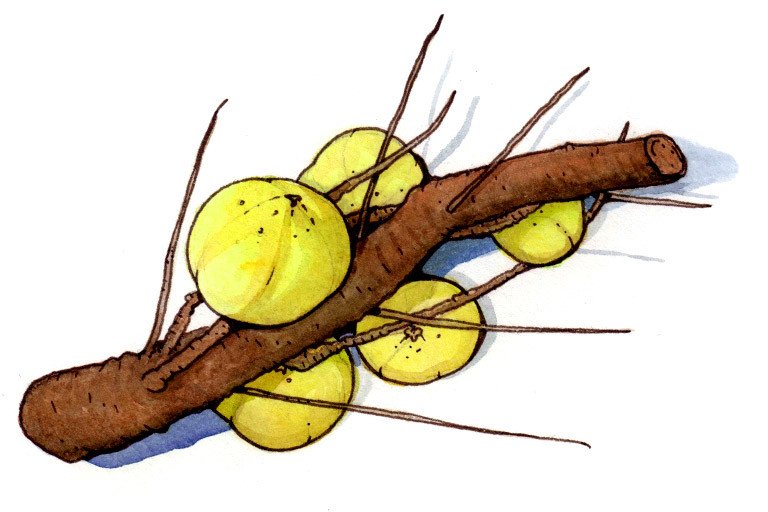
Common Names
- Gooseberry
- amla
- amalaka
- amalaki
For Patients & Caregivers
Tell your healthcare providers about any dietary supplements you’re taking, such as herbs, vitamins, minerals, and natural or home remedies. This will help them manage your care and keep you safe.
What is it?
Emblica officinalis has antioxidant effects. It has not been shown to treat cancer in humans.
E. officinalis is commonly used in Ayurveda, the traditional medicinal system of India, for various ailments including diarrhea, jaundice, headaches, inflammation, and as a tonic. It is also one of the constituents of a popular Ayurvedic formulation, Triphala. All parts of the tree including the dried and fresh fruits, seeds, leaves, root bark, and flowers are used. Studies done in the lab and in animals suggest that E. officinalis has antioxidant, antibacterial, liver protective, cardioprotective, antiulcer, antitumor, antidiabetic properties. Small studies in humans show that it has antioxidant and lipid-lowering effects.
E. officinalis has strong antioxidant effects, and may therefore interfere with chemotherapy and radiation therapy.
What are the potential uses and benefits?
- Diabetes
Small studies showed that E. officinalis improves HDL cholesterol and reduces LDL levels in diabetic individuals. - Cancer
Studies in mice that indicate that E. officinalis may inhibit tumor growth. However, human studies are needed in order to confirm this effect. - Cardioprotective Effects
Lab studies suggest protective effects against doxorubicin toxicity. - Diarrhea
There is no scientific evidence to support this use. - Jaundice
Used in traditional medicine for jaundice. Clinical data are lacking. - Headaches
Animal studies suggest E. officinalis can reduce fever and pain. - Inflammation
E. officinalis was shown to reduce inflammation in lab studies. Human data are lacking. - Chronic ulcers
Traditional use and results from lab studies support this use. - Hyperlipidemia
Data from lab studies and small human studies indicate hyperlipidemic effects.
What else do I need to know?
Do Not Take if:
- Clopidogrel: When used at the same time, E. officinalis extract was found to increase the antiplatelet activity in a study of patients with Type-2 diabetes.
- Ecosprin: The above study found increased antiplatelet activity with Ecosprin as well.
For Healthcare Professionals
Scientific Name
Clinical Summary
Emblica officinalis is a deciduous tree prevalent in parts of Asia. All parts of the tree, especially the fruit, are commonly used in traditional medicine for various ailments including diarrhea, jaundice, headaches, inflammation, and as a tonic (1). It is also a constituent of the popular Ayurvedic formulation, Triphala. The activity of E. officinalis is often attributed to its antioxidant constituents, such as ascorbic acid, polyphenols, flavonoids, and tannins (2) (3). Preclinical studies indicate antioxidant (1) (4) (5), antibacterial (6), hepatoprotective (7) , cardioprotective (3) radioprotective (8), antiulcerogenic (9), antitumor (10), analgesic (11), antidiabetic (12) and antihyperlipidemic (13) properties.
Limited clinical data suggest benefits in patients with uremia by reducing oxidative stress (5), for improving HDL and lowering LDL-cholesterol levels in diabetic patients (16), and for lowering lipid levels and blood pressure in patients with hyperlipidemia (17) (23), but ineffective in reducing hypertension (27). Supplementation with an E. officinalis extract was shown to lower multiple risk factors associated with cardiovascular disease in overweight adults (21), and as an adjunct, useful in the management of metabolic syndrome (24). It was also found to benefit those with non-erosive reflux disease (25), and helped reduce inflammation and periodontal destruction in patients with chronic periodontitis (26).
Because E. officinalis exhibits strong antioxidant effects, it may interfere with chemotherapy and radiation therapy.
Purported Uses and Benefits
- Diabetes
- Cancer prevention
- Cardioprotection
- Diarrhea
- Jaundice
- Headaches
- Inflammation
- Chronic ulcers
- Hyperlipidemia
Mechanism of Action
The antioxidant activity of E. officinalis is attributed to the high content of ascorbic acid (4), but it was reported that such effects may be due to the tannins, Emblicanin A and Emblicanin B (1). The antidiabetic property is thought to be due to the herb’s ability to reduce release of inflammatory cytokines that cause insulin resistance (12). E. officinalis may also play a role in preventing age-related hyperlipidemia by reducing nitric oxide synthase and cyclooxygenase-2 (COX-2) protein levels via inhibiting NF-kappa B activation (13). In another study, the herb extracts were shown to induce apoptosis in mature osteoclasts, an effect that may limit bone resorption in pathologies associated with bone loss (15). And a hydroalcoholic extract of E. officinalis demonstrated anti-inflammatory effects by increasing glutathione, superoxide dismutase, and catalase activities, and subsequently decreasing lipid peroxidation (19).
Several studies have also investigated the antitumor properties of E. officinalis. Pyrogallol, a component of E. officinalis extract, was found to cause cell cycle arrest in the G2/M phase, inhibit proliferation, and induce apoptosis in human lung adenocarcinoma (H441) and squamous cell cancer (H520) cell lines (2). Intraperitoneal pyrogallol injections also suppressed subcutaneous tumor growth in mice (2). An aqueous extract decreased tumor volume through inhibiting the cell cycle regulating enzyme CDC25 (10). Progallin, extracted from E. officinalis leaves, also caused cell cycle arrest in the G1/M and G2/M phase, inhibited proliferation, and induce apoptosis in human hepatocellular carcinoma cells (BEL-7404) (14). In other studies, E. officinalis extracts were shown to inhibit cell growth both in vitro and in vivo possibly via inhibition of angiogenesis and activation of autophagy in ovarian cancer cells (20); and demonstrated cardioprotective effects against doxorubicin toxicity in vitro (3), which was attributed to antioxidants.